Sunday, January 13, 2008
Hawaii's quest to remain a third-world country
Under the leadership of King David Kalakaua, Iolani Palace had electricity and telephone several years before the White House. Yes, it's true. Well, it's 2008 now, and the King's initiative and foresight are sadly lacking in our state government. But maybe it's not entirely their fault.
It's not just the current administration, whose idea of improving schools is to break up the system, or which believes that it can get away with withholding money for social services, pedestrian safety, or culture and the arts. The neglect of Hawaii's infrastructure is long-standing. It takes time for things to rust this badly. It takes continued neglect for a university to decay as the University of Hawaii has. Dams were not inspected for 11 years. The conditions leading to the deaths of seven people were long in the making. There's much more I or you could add, of course.
The poor condition of our roads cannot be blamed on former mayor Jeremy Harris any longer. They're Mufi's potholes now. It's also his bus that can't run on schedule, that won't give riders basic information like maps and timetables posted at bus stops. Heck, the bus stops usually don't even say what buses stop there, at what hours, or where they are going.
King Kalakaua would not have run things this way. I'm sure of it.
We deserve more than we are getting. Or do we? I agree with Richard Borreca's column in today's Star-Bulletin.
In Hawaii, chronic disrepair of the infrastructure such as neglected roads, harbors, bridges and schools has translated into the way to balance bad budgets. With this year's budget already bleeding red ink, don't expect the state to visiting Home Depot anytime soon.
It's not like people don't know about the chronic backlog of school repairs. It's in the papers every year. We know. But fixing schools is not our priority. If we cared, they would be fixed, don't you think?
It's not like we don't know that the roads are in bad condition. We drive on them, accepting the potholes, lack of paint, dangerous crosswalks and intersections and the lack of enforcement of traffic laws. In fact, we accept the high death toll that results from this neglect. If we cared, the roads would be fixed, and our kupuna could cross the street without fearing for their lives each time. Don't you think?
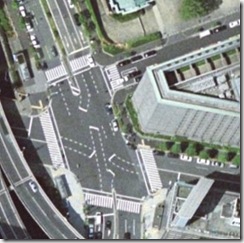 I just picked one intersection. You can choose any. Guess what: they are painted. Shiny white (if I recall correctly, they use reflective paint for added safety). (click photos for larger)
I just picked one intersection. You can choose any. Guess what: they are painted. Shiny white (if I recall correctly, they use reflective paint for added safety). (click photos for larger)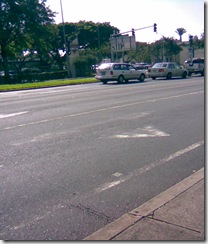 This shot is along Pali Highway. It's nothing special, just one of many thousands of examples of paint gone and not renewed. There's a little paint, or I wouldn't have a picture to show you. Give it a month or so and this will be bare.
This shot is along Pali Highway. It's nothing special, just one of many thousands of examples of paint gone and not renewed. There's a little paint, or I wouldn't have a picture to show you. Give it a month or so and this will be bare.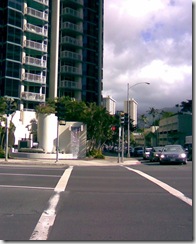 a crosswalk ahead. This one has no zebra stripes. No doubt there are several like this near where you live. At night, in the rain, would a driver slow down for this?
a crosswalk ahead. This one has no zebra stripes. No doubt there are several like this near where you live. At night, in the rain, would a driver slow down for this?Here's one across the street. Is this a crosswalk? It has about as 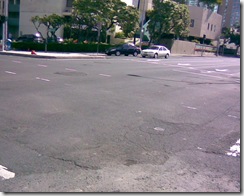 much paint as other intersections where the zebra stripes have been omitted. In fact, no, this one is not a crosswalk, but my point is that it looks exactly like others that are.
much paint as other intersections where the zebra stripes have been omitted. In fact, no, this one is not a crosswalk, but my point is that it looks exactly like others that are.
How about this one:
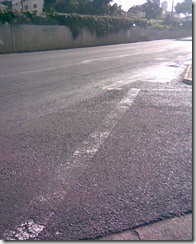 Yes, this one is a crosswalk. It's about to vanish forever.
Yes, this one is a crosswalk. It's about to vanish forever.
Or this one?
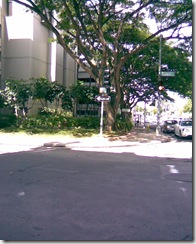 If you click to get a larger view, you might find the crosswalk signal. It's hard to see, and harder to tell if it's red or white in the sunlight. This is assuming you figure out that this is a crosswalk in the first place.
If you click to get a larger view, you might find the crosswalk signal. It's hard to see, and harder to tell if it's red or white in the sunlight. This is assuming you figure out that this is a crosswalk in the first place.
Will cars know it is a crosswalk? Are pedestrians safe using it?
Should we accept this as normaL?
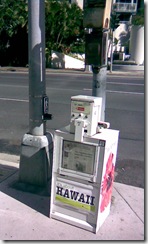 Imagine that a blind person is looking for the pedestrian button to cross the street. Or that someone in a wheelchair or scooter is thinking of getting across this street.
Imagine that a blind person is looking for the pedestrian button to cross the street. Or that someone in a wheelchair or scooter is thinking of getting across this street. http://picasaweb.google.com/UH.ugly
if you have other photos documenting the shameful state email them to uh.ugly@gmail.com
This (with a little sorting out), given publicity, could help keep the spotlight on conditions at our flagship university and perhaps shame the state into making improvements. I urge anyone with a cellphone camera to snap away and perhaps help anonymous build up this collection. Or make your own, and present it to the world. Citizen journalism can do a service, in this case.
The hospital situation has been in the news repeatedly. Doctors are leaving the Neighbor Islands so that some specialists are hard to find. Hospital beds are in short supply even on Oahu. It's in the papers every year. If you've read this blog for awhile, you know that I've written about lack of medical and hospital capacity as a real danger should a hurricane or other calamity strike the islands. No beds now means we won't be able to handle an emergency in the future, when, not if, disaster comes. If we cared, it would be fixed, don't you think?
In fact, we seem not to care. We're letting our government proceed with UH West Oahu even though it will mean that Manoa will continue to crumble into the dust. We drive the roads, potholed and unpainted as they are, without complaint. We say nothing about the conditions in our schools or the poor education that results from that sort of management. We are accepting of the decay in our medical infrastructure.
It's also no secret, apparently, to the outside world.
Although the athletic department's financial plight was well enough known that national commentators on ESPN radio snickered that if the UH budget was improved "the football team would get double-ply toilet paper," the message never seemed to make it from Manoa to the state Capitol.
Borreca is right. But why isn't government taking care of these things?
Because we let them get away with it.
C'mon, folks, don't just pay a bottle deposit tax for a refund system that doesn't work. Don't just pay the 12.5% increase in sales tax for a train (yes, Mufi's rumored to have decided on everything, including the vendor) to nowhere important. Don't leave fixing the schools to future generations.
Why should we expect that repairs will be made now, when they've never been made before? Do we think the streets will become safer if we take no action?
Predictably, tomorrow will be very much the same as today.
Unless, that is, ordinary citizens do something different. Unless they get angry, get together, and get some action from our government.
yes, indeed it is very sad thatw we let our public servants get away with their self serving, elitist ways. how do we live with ourselves? we deserve the best but settle for the worst. the mispriorities(funds for airports, harbors, highspeed large capacity ferries, etc.. but not for cafeterias, libraries, bridges, dams, teachers,inspectors,etc...)
some day the roosters will come home to roost and there won't be any home left. auwe, but don't give up. thanks for advocating the activist position of doing something about. empowerment not discouragement. imua!
topic of pedestrian safety: while more money might be a quick fix, i don't think it will do anything to help solve the problem.
a more enlightened approach to traffic management might be in order. perhaps something like this: http://www.resurgence.org/selection/booth0306.htm.
i don't think it's all that bad being a third world country. we have limited resources, we might as well face up to it and decide to be what we are.
Justin has a good point. Don't third world countries use alternative modes of transportation like walking and taking the bus? if that is what is meant as 3rd world, then I am all for it. Yes. More 3rd world walking and buses is what Hawaii really needs not more roads, more cars and more congestion. Enough already.
Josephine
Josephine, that's an interesting take on being a third-world country. I hadn't thought of it that way before.
Thanks for the insight!
Having lived in a 3rd world country I can tell you that public transportation and pedestrian safety are not the hallmarks Josephine is assuming. The defining characteristics are corruption, poverty and suffering. If you want to highlight public transportation then look to Japan, Switzerland, Germany and even France. People in 3rd world countries ride public transit (such as it is) as a necessary by-product of poverty. The wealthy and elite in these places do not use it. What Hawaii needs is smart planning, resource allocation, able execution and accountability. No more good-old-boys-club (or brah or ohana). Accountability irrespective of familial relation or origin. Embrace change as the inevitability of evolution. Embrace smart technologies and ideas even at the cost of minor short-term encroachments as enhancing an infrastructure will require.
ironhans, thank you for your excellent comment, and for renewing interest in that 2008 article. Your analysis is right on, as is your remedy.
<< Home




Post a Comment
Requiring those Captcha codes at least temporarily, in the hopes that it quells the flood of comment spam I've been receiving.